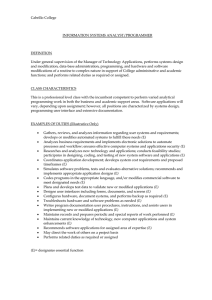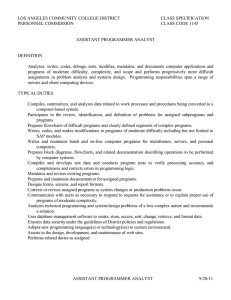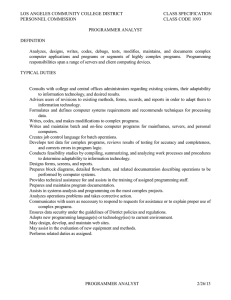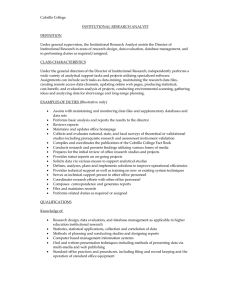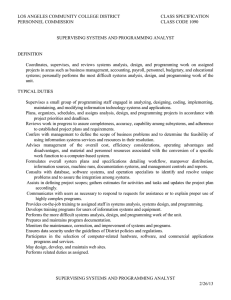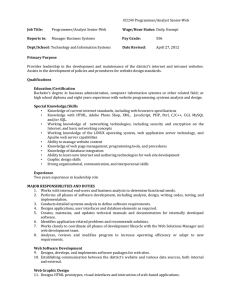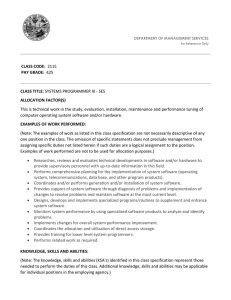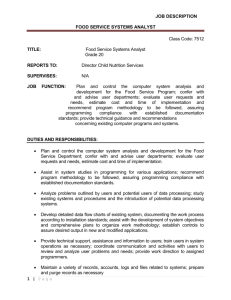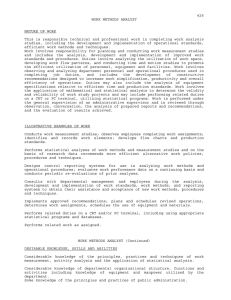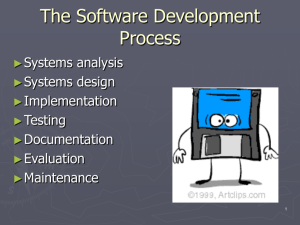LOS ANGELES COMMUNITY COLLEGE DISTRICT CLASS SPECIFICATION PERSONNEL COMMISSION CLASS CODE 1092
advertisement
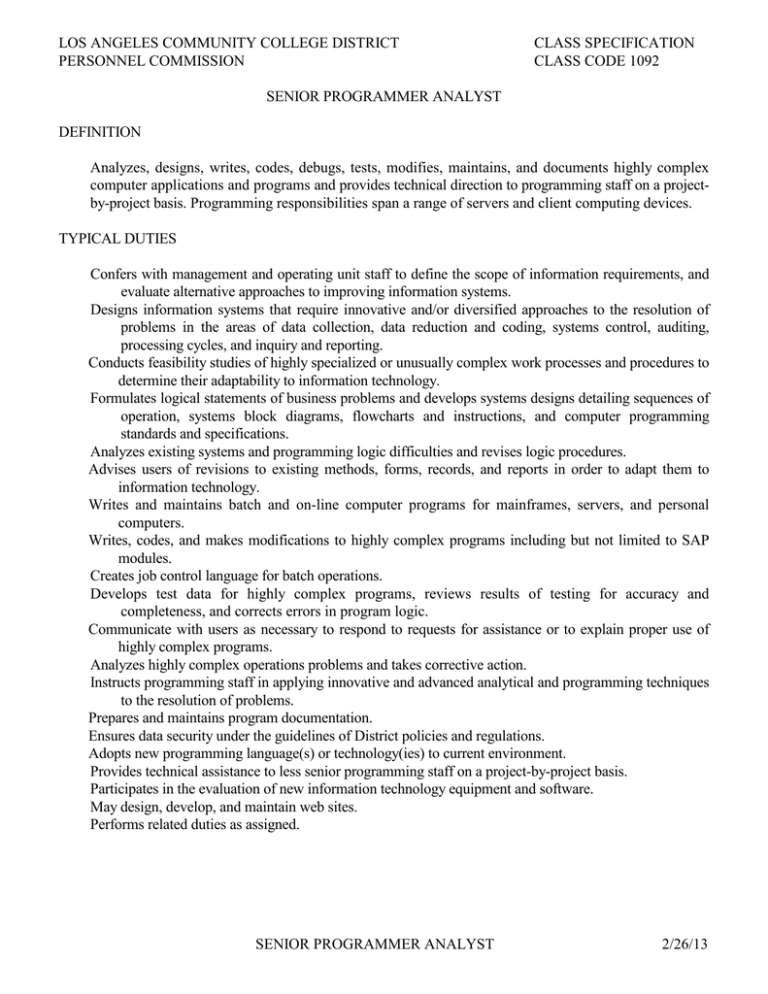
LOS ANGELES COMMUNITY COLLEGE DISTRICT PERSONNEL COMMISSION CLASS SPECIFICATION CLASS CODE 1092 SENIOR PROGRAMMER ANALYST DEFINITION Analyzes, designs, writes, codes, debugs, tests, modifies, maintains, and documents highly complex computer applications and programs and provides technical direction to programming staff on a projectby-project basis. Programming responsibilities span a range of servers and client computing devices. TYPICAL DUTIES Confers with management and operating unit staff to define the scope of information requirements, and evaluate alternative approaches to improving information systems. Designs information systems that require innovative and/or diversified approaches to the resolution of problems in the areas of data collection, data reduction and coding, systems control, auditing, processing cycles, and inquiry and reporting. Conducts feasibility studies of highly specialized or unusually complex work processes and procedures to determine their adaptability to information technology. Formulates logical statements of business problems and develops systems designs detailing sequences of operation, systems block diagrams, flowcharts and instructions, and computer programming standards and specifications. Analyzes existing systems and programming logic difficulties and revises logic procedures. Advises users of revisions to existing methods, forms, records, and reports in order to adapt them to information technology. Writes and maintains batch and on-line computer programs for mainframes, servers, and personal computers. Writes, codes, and makes modifications to highly complex programs including but not limited to SAP modules. Creates job control language for batch operations. Develops test data for highly complex programs, reviews results of testing for accuracy and completeness, and corrects errors in program logic. Communicate with users as necessary to respond to requests for assistance or to explain proper use of highly complex programs. Analyzes highly complex operations problems and takes corrective action. Instructs programming staff in applying innovative and advanced analytical and programming techniques to the resolution of problems. Prepares and maintains program documentation. Ensures data security under the guidelines of District policies and regulations. Adopts new programming language(s) or technology(ies) to current environment. Provides technical assistance to less senior programming staff on a project-by-project basis. Participates in the evaluation of new information technology equipment and software. May design, develop, and maintain web sites. Performs related duties as assigned. SENIOR PROGRAMMER ANALYST 2/26/13 DISTINGUISHING CHARACTERISTICS A Senior Programmer Analyst performs systems analysis, design, and programming duties involving highly complex computer applications and programs; provides technical direction to programming staff on a project-by-project basis. A Supervising Systems and Programming Analyst is responsible for supervising the work of a small group of programming staff, provides liaison with operating units affected by studies, and personally performs the most difficult systems analysis, design, and programming work of the unit. A Programmer Analyst performs systems analysis, design, and programming duties involving complex computer applications and programs or segments of highly complex programs; may provide technical assistance to assigned programming staff. An Assistant Programmer Analyst performs routine programming duties and performs progressively more difficult assignments in problem analysis and systems design under the work direction of journeylevel programming staff. SUPERVISION General supervision is received from a Systems and Programming Manager or Supervising Systems and Programming Analyst. General supervision is exercised over assigned programming staff on a projectby-project basis. CLASS QUALIFICATIONS Knowledge of: Complex computer programming techniques Programming languages such as C, C++, Visual Basic, Java, COBOL, ACMS, Visual Basic for Applications (VBA), ABAP, etc. Script languages such as Vbscript, Javascript, Jscript, PERL, etc. Reporting tools such as MS Access, Crystal Reports, webFOCUS, etc. Database systems such as Rdb, Oracle, Access, SQL Server, etc. Enterprise Resource Planning (ERP) systems such as SAP, Peoplesoft, Oracle, etc. Capabilities of mainframes, application, database, and web servers and other equipment Web page design and development using tools such as .ASP, Dreamweaver, Visual Studio, SAP Portals, etc. Fourth generation languages such as FOCUS Principles of systems analysis, design, and testing Principles of report, forms, and screen design Principles of program documentation Information technology concepts and capabilities New trends in the field of information technology Business procedures and methods Principles of training Principles, procedures, and methods used in data acquisition, storage, structuring, and retrieval Principles and practices of business and public administration English usage, punctuation, and spelling SENIOR PROGRAMMER ANALYST 2/26/13 CLASS QUALIFICATIONS (Cont.) Ability to: Conduct surveys and feasibility studies Prepare clear and logical systems design Analyze highly complex problems in information systems Write and code highly difficult and complex programs Develop test data and analyze problems in highly complex programs Prepare block diagrams and flowcharts Prepare clear and logical system designs Adapt business methods and procedures to information technology Write clear and logical program documentation Write clear and comprehensive reports and instructions Fully utilize the commands, functions, and operations commonly used in mainframe, server-based, client-based, and other related software Respond to highly complex programming needs/problems accurately and take appropriate action Communicate highly complex technical concepts both orally and in writing Provide technical assistance to users and staff members with lower-level technical skills Work effectively and cooperatively with District staff Train staff assigned to projects Learn and apply new concepts in information technology Learn the characteristics of new systems and update skills to adapt to changing technology ENTRANCE QUALIFICATIONS Education and Experience: Graduation from a recognized four-year college or university preferably with a degree in management information systems, computer science, computer engineering, or related field AND three years of recent full-time paid experience in business applications analysis, design, and programming for medium or large scale, multi-programmed computers. Experience with an Enterprise Resource Planning (ERP) system is desirable. Special: A valid Class “C” California driver's license may be required for some positions. Travel to locations throughout the District may be required for some positions. Revised SENIOR PROGRAMMER ANALYST 2/26/13
